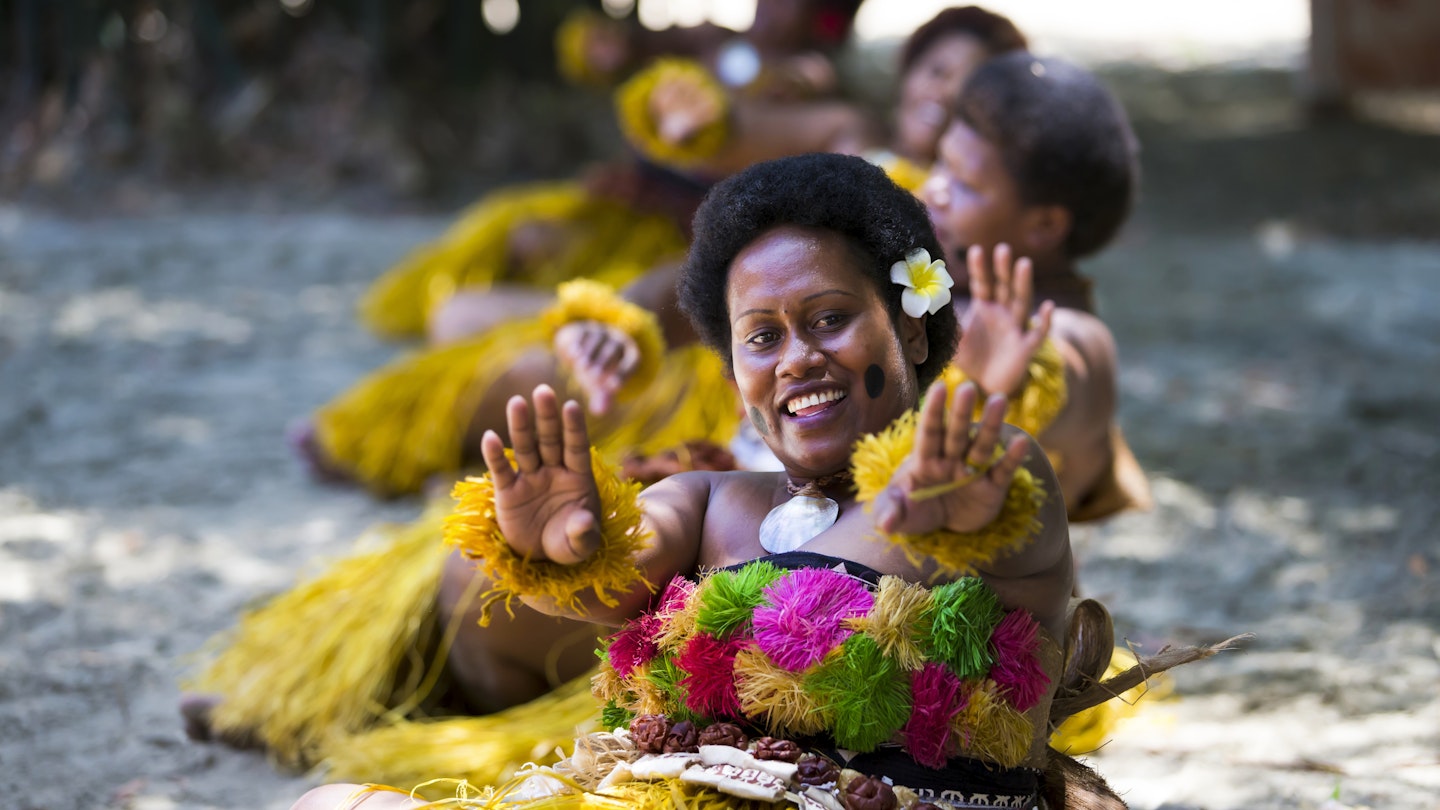10 Reasons Why Fiji Is One of the Happiest Places on Earth
If someone asked, “Are you happy?” what would you say? Well, if you lived in Fiji, there is an almost nine-times-out-of-10 chance you’d say “yes!” According to WIN-Gallup, 89% of Fijians report they are happy, making Fiji one of the happiest countries globally. Here are ten reasons why Fiji is such a spirit-lifting destination.
1. Color
With myriad greens in the landscapes, yellows and chartreuse mingling as palm trees rustle in the breeze, and the bright oranges of ripe mangos and papayas, Fiji flaunts all the feel-good colors. White waterfalls tumble into black lava rock pools, offering calming notes. Everywhere you turn, there’s something colorful to make you smile. Moreover, the brilliant blue and green of a sea that’s comfortably warm enough to plunge into, while still being refreshing, beckons you. Below the surface, thriving corals and an abundance of fish promise excitement. Dive in, because few things on Earth can make you feel better than a dip in a turquoise blue sea.
2. Climate
With balmy temperatures hovering between 79 to 88 degrees Fahrenheit (26 and 31 degrees Celsius), few complain about the cold in Fiji. Clothes are needed for modesty only, and life happens mostly outdoors. With all the sunshine, no one is going to end up vitamin D deficient, and plenty of rain keeps the land fresh, thriving with abundant food and clean water. This facilitates keeping in tune with nature, perhaps by enjoying the phases of the moon on warm nights, embracing the joy of a sunset, or appreciating a happy jolt from cool raindrops on the skin.
3. Community
Fiji has a very tight-knit society that is mostly village-based. Even the cities feel small, and aunts, uncles, and cousins are likely to live in the same neighborhood. Kids are cared for by the community; the crime rate is low. Young people are free to roam around and play. The bond between people and the support they offer each other are palpable. Perhaps it’s this solid base that makes Fijians so friendly and welcoming to visitors.
4. Fresh Food
Fiji is renowned for having some of the best food in the South Pacific, thanks to Indian, Southeast Asian, and Chinese influences blended with Melanesian staples like taro, tropical fruits, coconut, pork, and seafood. Because it’s costly to import food, much of what’s available is local and fresh. This evolving organic kitchen garden movement benefits individuals, villages, and resorts alike. Just looking at the fruit dripping from the trees, the plethora of fish in the ocean, and the enticing aromas wafting from local eateries is enough to make anyone smile—and lick their lips.
5. Kava
Called Yaqona in Fiji, this ceremonial drink is more popular than beer in these islands. Passing through any village, chances are someone will be enjoying it, and they may offer you a bowl or two. It tastes like muddy water; however, if you drink too much, your mouth becomes numb, but in return, you experience a sense of well-being, as the beautiful Fijian world around you becomes even more calm. The process itself is relative relaxing: half-coconut bowls are passed to each drinker individually, and after clapping your hands and saying “bula” (meaning hello and more), you ideally down it in one gulp. This social ceremony brings people together while they enjoy the tranquility of kava.
6. Music
A warm starry night, a good meal, and some kava inevitably mean that guitars come out, and everyone sings, slaps their knees, plays the spoons, or just hums along. You won’t be hearing anything too serious or sad—instead, expect fast-paced Fijian tunes or upbeat Western favorites. Even the biggest grouch would be hard-pressed not to smile with this kind of revelry going on.
7. Fiji Time
No watch? No problem. No one hurries in Fiji. When plans are delayed or things don’t go as expected, people don’t worry or dwell. Instead, they may take a nap, chat with a friend, or enjoy another bowl of kava. This elastic attitude about time alleviates much stress. What will be will be; just keep on having a good time.
8. Ceremony
Religion runs deep in Fiji, with Christian, Islamic, Hindu, and Sikh faiths well represented. However, beyond the churches and temples, the Fijian culture itself holds many traditions. The practice of Sevusevu, whereby a visitor presents the village elder kava root to participate in a traditional ceremony, is deeply significant. While walking through villages, it’s imperative to wear a sulu (sarong), ensuring that shoulders and upper bodies are covered, while avoiding carrying bags from shoulder straps or wearing hats. While these rules may seem complicated, they demonstrate respect for the community and promote unity.
9. Multiculturalism
Visitors often encounter the native Fijian side of Fiji, but only 57 percent of the population claims full Fijian ancestry. The majority of the remaining islanders are Indo-Fijians of Indian heritage, along with Southeast Asians, Europeans, and other Melanesians and Polynesians. Although a mix of cultures can lead to complexities, it also keeps life interesting. If variety is the spice of life, Fiji is undoubtedly a fiery hot curry.
10. Peace
Fiji has had a tumultuous political history and only recently held open democratic elections again after a coup in 2006. Yet, even at its most turbulent times, serious violence has not been an issue here. The current situation appears more stable, as the isolation of island life encourages residents not to worry too much about global problems. The closeness of local governments allows people to feel that their opinions and community actions genuinely impact.
This article was originally published October 2014 and updated November 2020.





